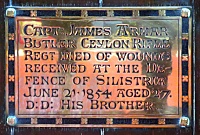The plaque is on the back of one of the choristers stalls in the chancel.
South side, front row, fifth from the west end.

BUTLER CEYLON RIFLE
REGT DIED OF WOUNDS
RECEIVED AT THE DE-
FENCE OF SILISTRIA
JUNE 21 1854 AGE 27.
DD: HIS BROTHER.
Further Information
"Major (sic) Butler, the 'Hero of Silistria' served during the Kafir War 1846-7, in the 90th Light Infantry (medal) and afterwards in the Ceylon Rifle Corps; died 13th June 1854, aged 27, from a wound received while engaged in the glorious defence of Silistria. His skill and heroism commanded the admiration of the world." [From the 1873 Guide to the Church]
James Armar Butler was one of the four sons of Lieut. General The Hon. Henry Edward Butler who are commemorated on a plaque beneath the South-West window in the chancel.
From the Oxford Dictionary of National Biography
By Henry Morse Stephens
"BUTLER, JAMES ARMAR (1827–1854), captain in the army, born in 1827, was the fourth son of Lieutenant-general the Hon. Henry Edward Butler, who had served in the 27th regiment in Egypt, and afterwards as a colonel in the Portuguese army at Busaco, where he was wounded. He was nephew of Somerset Richard Butler, third earl of Carrick. He was educated on the continent and at Sandhurst, and received his commission as an ensign in the 90th regiment in 1843. He served in the Caffre war of 1846–7, was promoted lieutenant in 1847, and purchased his captaincy in the Ceylon rifle regiment in May 1853. He was in England on furlough in the summer of 1854, when the war between Russia and Turkey had just broken out, and since he could not hope to be ordered with the expeditionary force, he set out with a friend, Lieutenant Charles Nasmyth, of the Bombay artillery, to see the fighting. The two friends went first to Omar Pasha's camp at Shumla; but as he did not seem inclined to advance, they asked leave to join the garrison at Silistria, to which the Russian army had laid siege on 19 May. Butler and Nasmyth soon obtained over the garrison the same absolute power that Eldred Pottinger acquired at Herat. The key to the fortress was believed to be the earthwork known as the Arab Tabia, and this work was perpetually bombarded and mined by the Russians, and attacked by heavy columns at all hours of the day and night. Mussa Pasha, the Turkish commandant, was killed, and so was the Russian commanding engineer; but still Omar Pasha would not send help, and when General Cannon (Behram Pasha) did introduce his brigade, he dared not keep it there, and retired within two days. On 13 June Butler had been slightly wounded in the forehead; privation and hard work made the wound dangerous, and on 22 June, two hours before the Russians retired, the hero of Silistria—who deserves the credit, though but a young English captain of twenty-seven, of defeating a whole Russian army—died peacefully without knowing of his triumph. On 14 July, before the news of his untimely death arrived, he had been gazetted a major in the army, and lieutenant and captain in the Coldstream guards."
The following letter from the Horse Guards to the brave officer's father, Lieutenant-General the Hon. H.E. Butler, tells how Butler exerted himself, and how duly his services had been appreciated by Queen Victoria:-
Horse Guards, July 1855.
" Sir,—I have heard with the deepest regret of the loss which you and the army have sustained by the death of your distinguished son, Captain J. A. Butler, of wounds and fatigue at the siege of Silistria.
During the whole of that siege, your son displayed very rare qualities, combining with the skill and intelligence of an accomplished officer, the intrepidity of the most daring soldier at one moment gaining the confidence of the garrison (over which he had only the authority of a very young volunteer) by the example of his personal valour, at another, prolonging the defence of the place by the prudence and firmness of his counsel:, and on all occasions infusing into those around him that spirit of heroic resistance which led to its triumphant defence.
"I deeply deplore your affliction in losing such a son, but your sorrow is felt by the country, the army, and the Sovereign.
"The Queen has recognised his merit by placing him in the Guards, and conferring upon him army rank, trusting that he might pursue a career of which all were so proud at that time; not being aware of the dangerous state of his health.
"The blow is unexpected and most severe, but I trust you will bear up against it by the fact that your son's services have been most valuable to his country, in promoting the success of a just war, and I hope I shall not give you pain by alluding to another son — Captain H. T. Butler, of the 15th Regiment — selected for employment on the Quartermaster-General's staff, when the army first embarked for Turkey, solely on account of the ability he had shown in his studies at the Royal Military College.
"I trust that the well-earned fame of one son, and the rising merit of the other, will, under Providence, be a source of consolation to you at this moment of extreme affliction.
"Pray accept, my dear General, the condolence of your very faithful servant,
HARDINGE.
